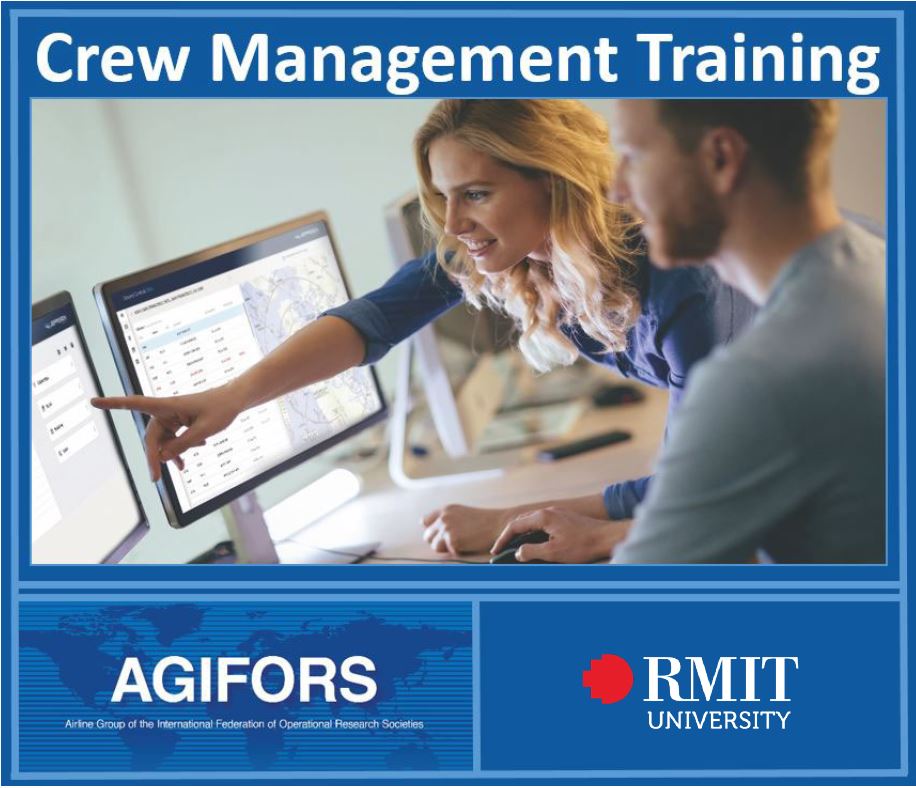
Background
At the AGIFORS crew management study group 2022, during the airline panel, it was identified that there is a "shared pain" among (participating) airlines from all regions and business models: the training for people work in crew management is not standardised, there is no curriculum other than company-internal materials and the onboarding of new people depends on company internal training capacities. Also there is no common "language" which makes it harder for joiners.
An idea was born: what if there is a certain standard-curriculum which teaches everyone in the crew management domain a certain basis?
But is there enough commonality across all continents and businesses? And is there enough demand to streamline this?
The survey
AGIFORS and the Royal Melbourne Institute of Technology (RMIT) are teaming in order to find answers for the two questions:
(1) Is there enough commonality in terms of shared pain and common business practise within the global airline community in the crew management domain?
(2) Is there enough demand to justify the invest into building up a standardised training?
The survey will be executed online and under the scientific oversight of RMIT. It is aimed to allow completion within 10 minutes and shall be spread globally.
The results
The results of the survey shall be available in late spring / early summer 2023 and will be presented at the AGIFORS crew management study group 2023.
Meet the teamThe survey is a joint undertaking by AGIFORS and RMIT. It is conducted by the following team
| News18Nov22We are delighted being able to inform that the survey is open now. We encourage all of you to participate. Please read the consent statement prior completing the survey and learn more about our ethical standards on that survey. You can find the survey here. 15Sep22We did present the plan at the AGIFORS symposium in Toulouse and are delighted about the positive feedback we already received. It gives us confidence that we are an a right track. On the survey: the preparations are ongoing and we're still in ethical clearance process. We will inform here and through all channels once the survey will be open. For the time being, please feel free to leave your contact details. Access the SurveyContact DetailsWe would like to be able to get in touch with you. If you agree, please go to the following link ot leave your contact details. GlossaryIn the context of the survey certain terms are being used. We are aware that those terms are not globally the same and may be interpreted differently. Thus the following list should help translate the terms used in the survey towards the local common term. Crew controlCrew control contains the processes and activities carried out in order to maintain rosters / duty plans as well as pairings compliant, feasible and complete from the moment of publication / release until day of operations. Depending on the organisation, these activities are covered by other terms. Some of them in use are crew tracking, crew scheduling, crew steering, crew recovery, crew scheduling, crew support, crewing, CSD or roster maintenance. Crew pairingA crew pairing is a combination of flight legs into a sequence resulting in planning objects which usually start and end at the same crew base. Pairings are a crew planning object aiming to cover all flights and distribute workload across all bases. Depending on the organisation, these activities are covered by other terms. Some of them in use are trip, pattern or crew route. The process for building those crew pairings is commonly covered by the terms crew pairing generation, crew planning, crew rostering, crew route construction, crew scheduling or pairing planning. Crew rosteringCrew rostering contains the processes and activities carried out in order to distribute the crew pairings on individual people. Depending on the organisation, these activities are covered by other terms. Some of them in use are are crew bid award, crew planning, crew scheduling or rostering. Crew training planning managementCrew training planning management contains the processes and activities carried out in order to ensure all flight crew is properly trained to carry out flight duties. It covers initial training (e.g. type ratings or upgrades) as well as recurrent training (e.g. proficiency checks or medical). Depending on the organisation, these activities are covered by other terms. Some of them in use are are crew manpower planning, crew planning, crew resource planning, crew training, crew training scheduling, crew training tracking, flight crew training, pilot training planning, cabin crew training, training admin, training support. Headcount / capacity managementHeadcount / capacity management contains the processes and activities carried out in order to derive the required amount of flight crew for a given flight schedule. Depending on the organisation, these activities are covered by other terms. Some of them in use are (crew) capacity planning, crew planning, crew resource management, crew resource planning, crew staffing, establishment planning, manpower planning or workforce planning. Operations researchOperations research, often shortened to the initialism OR, is a discipline that deals with the development and application of advanced analytical methods to improve decision-making. It is considered to be a subfield of mathematical sciences. The term management science is occasionally used as a synonym. Source: Wikipedia |
Voices
Despite we do not know about the the survey outcome, there are already voices indicating that a focus on training of crew management staff requires more attention.
As an IT expert, who joined aviation after a long career in other industries, I can clearly see how special this industry is.
The language used, the operational requirements and constraints, the culture, but also the limitations like for example Crew Duty Time limitations, are difficult to understand.
It would help me tremendously to implement and maintain our Ops and Crew management IT Systems, if a proper training would be available.
I can also clearly see that our personnel through the whole crew supply chain in all crew management departments would benefit very much from a proper, standardized training, and would utilize the IT systems better with a better outcome for crew resource allocation, efficiency, crew satisfaction and fatigue risk management.
Patricia Bouillé - IT Flight Operations Project Manager
Yes, crew members are demanding customers. But at the same time, crew members have direct control over variables such as efficiency, service and flexibility. Happy crews save a lot of money.
Training is needed to make value creation through appreciation a reality.
Martin Stork - Boeing B737 Captain, Consultant / Company Culture & Human factors Expert
So often in the areas of crew resources management and day of operations the focus is on regulator driven mandatory training. What is the minimum that needs to be done to be compliant.
For our teams to flourish and grow there needs to be a comprehensive training plan not only focussed on technical aspects but also on soft skills, KPI's, team working and the development of the future leaders.
Also how their job fits into the bigger picture, understand the end to end process and the impact on the business of the decisions they make.
A comprehensive training programme is critical for a successful team.
Martin Bailham - Group Head, Network Management Air Asia Airlines Group
Within the corona crisis, we have designed a new long-haul airline in the Lufthansa Group from scratch and use organizational forms tailored to us between Crew Management and Ops Control Steering.
To this end, we have attached particular importance to efficiency and effectiveness in cooperation between the crews and all other departments involved in the field of Ops Control. Based on the experience gained in the past, we considered it necessary to prepare the employees involved for the processes right from the start and to train them in particular: Lufthansa Aviation Training Flight Operations Academy trained our employees in EASA ORO FTL Basic, EASA history & general overview, fatigue risk management, human factors and OM.
For this purpose, the have designed competence-based exercises specially tailored for Discover.
In the further course, we attended and will attend frequent refresher trainings based on the experience gained in our operation.
Here, competence-based (computing and practical) exercises were used “in the head”, on paper and by means of IT in order to understand the basics even without a system and to be able to work proactively with situational awareness, and we can see the high value of this investment into our people.
Thorsten Beck, NPFO Eurowings Discover
 Wim J.C. Verhagen Ph.D M.Sc. B.Sc. (RMIT)
Wim J.C. Verhagen Ph.D M.Sc. B.Sc. (RMIT) Dr Selina Fothergill Ph.D (RMIT)
Dr Selina Fothergill Ph.D (RMIT) Chrystal Zhang Ph.D (RMIT)
Chrystal Zhang Ph.D (RMIT) Marcel Sol (AGIFORS crew study group co-chair)
Marcel Sol (AGIFORS crew study group co-chair) Philipp Reske (AGIFORS crew study group co-chair)
Philipp Reske (AGIFORS crew study group co-chair) Tim Nickel (AGIFORS member)
Tim Nickel (AGIFORS member) Anita Ellmer (AGIFORS member)
Anita Ellmer (AGIFORS member)
